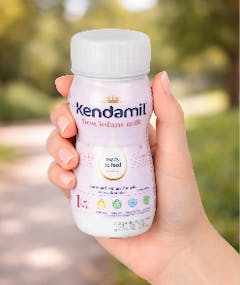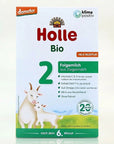
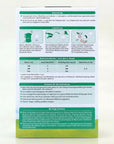
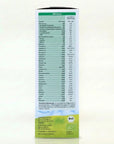
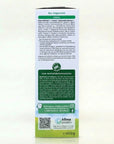
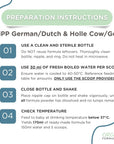
similar formulas
Holle Bio Stage 2 Goat
Premium Organic Goat Milk European Baby Formula

For ages
From: in 30-pack
Unit size:
Yields: of ready-made formula
+ FREE Shipping
BEST DEAL!
+ New U.S. import duties according to this table
Holle Organic Goat Milk Formula Stage 2
Holle Goat Stage 2 infant milk formula serves as a popular alternative to cow's milk-based formulas, particularly by infants who exhibit sensitivity to cow's milk proteins. This formula is intended to be used as a follow on formula from Holle Goat Stage PRE or Holle goat milk formula stage 1, from 6 months to 10 months of age.
This Holle Goat Milk Formula is easier on the digestive system compared to equivalent cow's milk formulas due to its lower content of complex milk proteins typically found in cow's milk-based formulas. Goat milk naturally contains the A2 protein.
Organic Full Cream Goat's Milk Powder, Organic Maltodextrin, Organic Lactose, Organic Vegetable Oils (Organic Sunflower Oil, Organic Rapeseed Oil, L-Choline, Calcium Hydroxide, Microalgae Oil, L-Cystine, Calcium Carbonate, Magnesium Chloride, Vitamin C, L-Tryptophan, L-Tyrosin, Sodium Citrate, Sodium Chloride, Iron Lactate, Inositol, Vitamin E, Zinc Sulfate, L-Carnitine, Niacin, Pantothenic Acid, Copper Sulfate, Vitamin A, Vitamin B1, Vitamin B6, Folic Acid, Vitamin B2, Manganese Sulfate, Potassium Iodide, Vitamin K, Sodium Selenite, Vitamin D3, Biotin, Vitamin B12.
Your order will be processed within 2 business days and then promptly shipped out. All shipments are handled by UPS Express.
Shipping typically averages between 2-5 business days.
Please note that we are not responsible for any taxes and or duties that may be charged by the carrier before arrival at your destination.
similar formulas
WHY DO BABIES LOVE Holle Bio Goat Stage 2 FORMULA?
A step above organic
Preparation
- IMPORTANT: Only use the scoop provided in the box.
- Clean and Sterilize everything (bottle, nipple and ring)
- Use freshly boiled water only
- Cool water to optimal mixing temperature at or below 122°F / 50°C
- Add desired amount of water to bottle using the volumes in the feeding table below.
- Add one unpacked scoop of formula for every of water.
- Shake well until dissolved and no lumps remain
- Cool to drinking temperature at or below 98.6°F / 37°C
- Happy feeding!
Care instructions
- Expiration date is indicated on each box in the European format DD/MM/YY
- Store formula powder in a cool, dry place. Do not refrigerate
- Keep airtight and use within 3 weeks
- Only use the scoop provided. Do not mix with anything else (such as other milk)
- Use the bottle of prepared formula within 1 hour
- If refrigerated, a prepared bottle of formula should be used within 2-12 hours
The amount of formula needed per month depends on your baby's eating habits, and whether or not formula is their primary source of food. Below you'll find a sample table for ages 0 - 12+ months based on a 400 g package of Holle Bio Stage 2 Goat formula.
| Age | Water | Scoops | Formula Volume | Meals Per Day | Packs Needed |
| 0-3 Months | 90 ml (3 oz) | 3 | 100 ml (3.2 oz) | 5-7 | 7 / month |
| 3-6 Months | 120 ml (4 oz) | 4 | 135 ml (4.6oz) | 5-7 | 8 / month |
| 6-10 Months | 180 ml (6 oz) | 6 | 200 ml (6.7 oz) | 5-6 | 12 / month |
| 10-12 Months | 210 ml (7oz) | 7 | 235 ml (8 oz) | 3-4 | 9 / month |
| 12+ Months | 210 ml (8oz) | 7 | 235 ml (8oz) | 2-3 | 6 / month |
European Organic Farms

About Holle
your baby deserves the best

Frequently Asked Questions
-
WHEN SHOULD I SWITCH TO HOLLE STAGE 2?
You should switch to Holle Stage 2 formula when your baby is around 6 months old, as it is designed for infants aged 6 to 10 months. Gradually introduce it by replacing one feed at a time over 1 to 2 weeks, starting with the morning feed, while monitoring your baby's response for any digestive changes. If any issues arise, consult your pediatrician.
-
IS HOLLE GOAT MILK FORMULA SAFE?
Holle goat milk formula is generally safe and high-quality, meeting strict European organic standards for infant nutrition. It's designed to be easily digestible, potentially causing fewer digestive issues compared to cow milk formulas. However, parents should always consult their pediatrician before switching formulas, carefully follow preparation instructions, and ensure the formula is age-appropriate. While goat milk formula can be a good alternative for babies with cow milk sensitivities, it's crucial to use a properly fortified, commercial infant formula, not raw goat milk, which is unsafe for infants under one year.
-
DOES HOLLE FORMULA CAUSE GAS?
Holle formula typically does not cause significant gas, as it's designed to be easily digestible, especially their goat milk variants which form softer stomach curds. However, some babies might experience temporary gas or digestive changes when transitioning to a new formula. Factors like individual baby sensitivity, proper preparation, and gradual introduction can influence gas production. If your baby experiences persistent gas, discomfort, or unusual digestive symptoms after using Holle formula, consult your pediatrician to rule out any potential issues and ensure the formula suits your baby's nutritional needs.
-
CAN BABIES DRINK GOAT MILK INSTEAD OF FORMULA?
No, babies should not drink pure goat milk instead of formula. The American Academy of Pediatrics warns that goat milk (and other animal milks) is unsafe and potentially life-threatening for infants under 1 year of age. Goat milk alone lacks essential nutrients needed for infant growth, has excessive protein content that can stress an infant's kidneys, and may cause anemia due to low folate levels. Instead, infants should be fed breast milk or properly formulated infant formula designed to meet their specific nutritional needs. If considering an alternative to cow's milk-based formula, parents should consult a pediatrician about goat milk-based infant formulas, which are fortified with necessary vitamins and minerals.
-
DOES HOLLE GOAT MILK CONTAIN PALM OIL?
Based on the ingredient lists provided, Holle goat milk formula does not contain palm oil. The vegetable oils used in Holle goat milk formulas are typically sunflower oil and rapeseed oil. These oils are used to provide essential fatty acids and energy for the infant's growth and development. The absence of palm oil in the formula may be seen as a positive aspect by some parents who prefer to avoid this ingredient.






